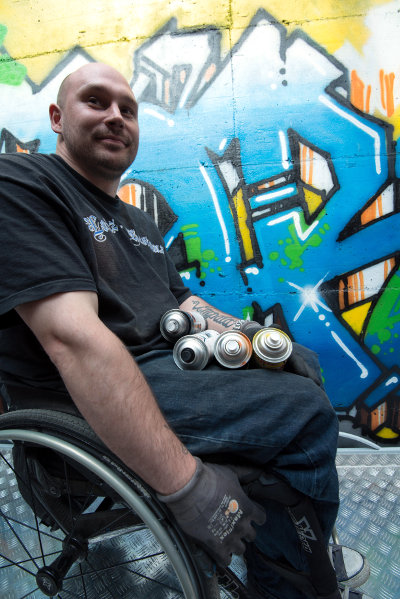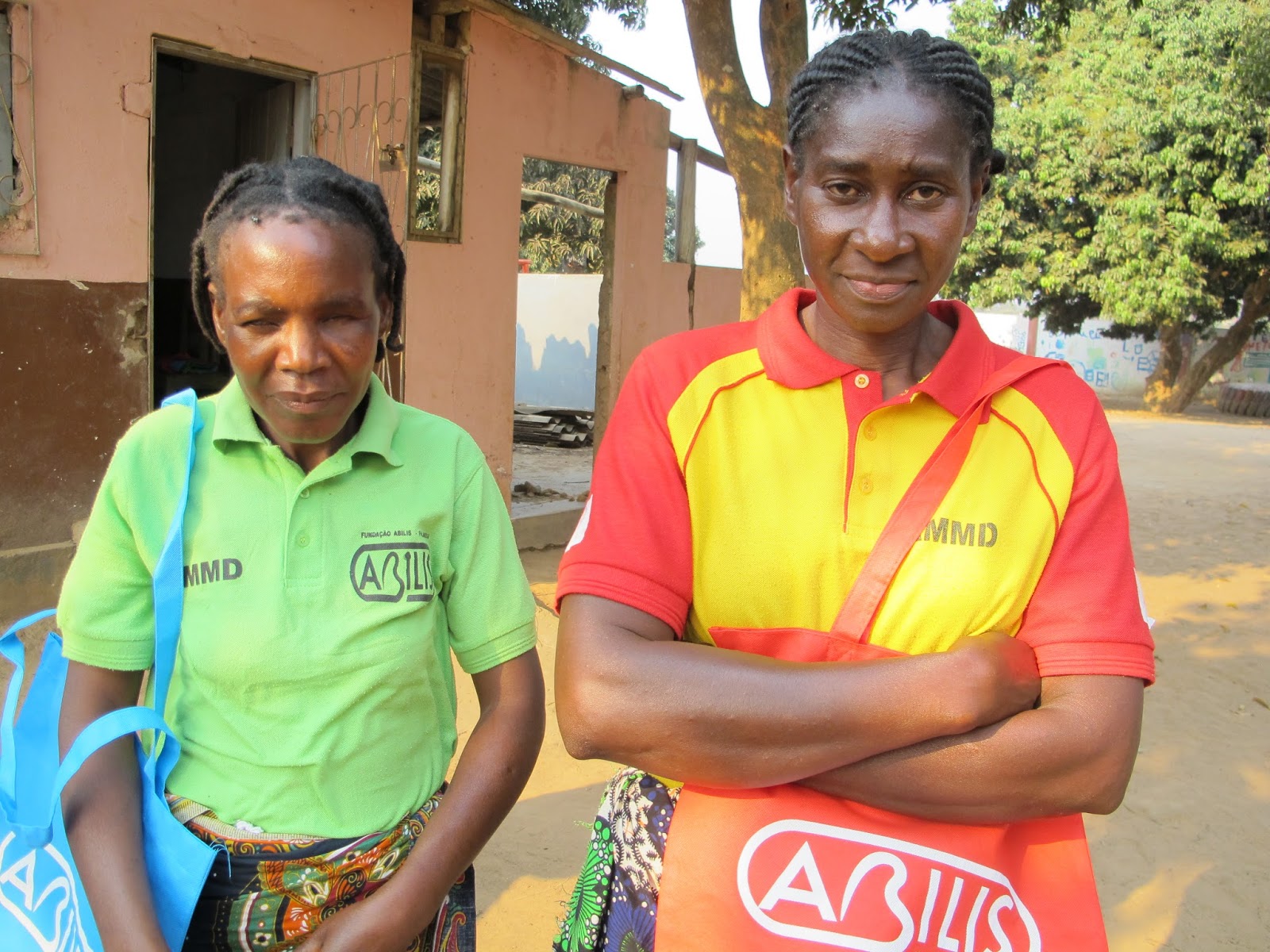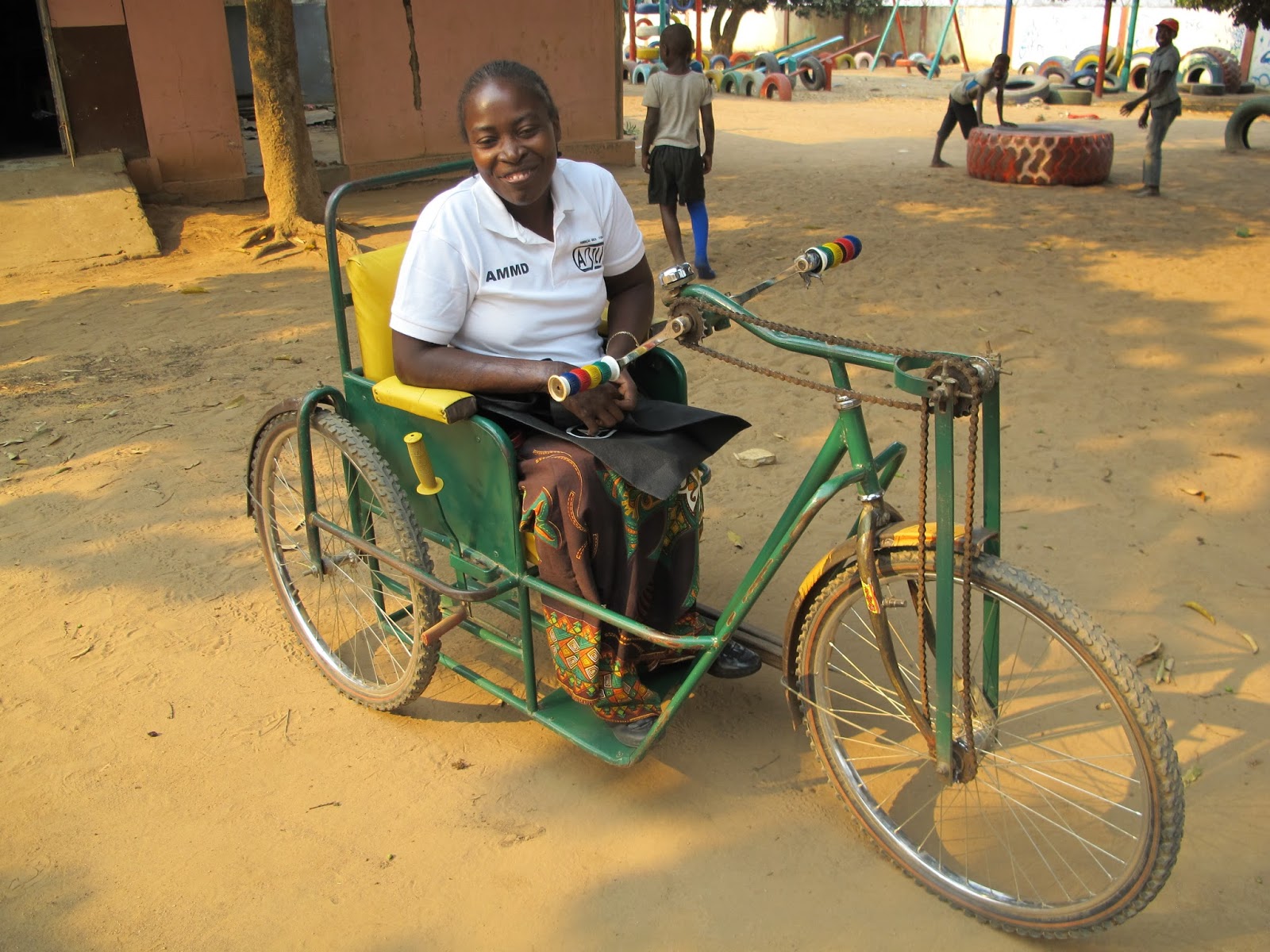Abilis Finland – for partipation and empowerment of people with disabilities
By Denise Nanni
and Milena Rampoldi, ProMosaik. In the following our interview with Marjo
Heinonen of the Finnish organisation Abilis,
financing projects to help disabled
people all over the world. Would like to thank Marjo for his time and his
detailled answers. For ProMosaik supporting disabled people means including
them in our lives and societies.
and Milena Rampoldi, ProMosaik. In the following our interview with Marjo
Heinonen of the Finnish organisation Abilis,
financing projects to help disabled
people all over the world. Would like to thank Marjo for his time and his
detailled answers. For ProMosaik supporting disabled people means including
them in our lives and societies.

What are the main
problems that you face while implementing your projects? (institutional, social..)
problems that you face while implementing your projects? (institutional, social..)
Abilis is donor
agency, a NGO Foundation, for people with disabilities and their organizations.
This means in practice that Abilis is not implementing the projects, but
funding them and providing some technical assistance. The unique approach of
Abilis is to reach grassroots level groups that have very little other funding
sources available, very little earlier experience in project design,
implementation and reporting. This means that the main problems, or challenges,
Abilis faces in its core work are the following:
agency, a NGO Foundation, for people with disabilities and their organizations.
This means in practice that Abilis is not implementing the projects, but
funding them and providing some technical assistance. The unique approach of
Abilis is to reach grassroots level groups that have very little other funding
sources available, very little earlier experience in project design,
implementation and reporting. This means that the main problems, or challenges,
Abilis faces in its core work are the following:
– Disabled
People’s Organizations (DPOs) at the grassroots level have a limited capacity
to plan and implement projects, have poor knowledge of financial management and
its practices such as receipts of purchased items, book keeping and audit. Even
the term ‘project’ may be not well understood. This is linked with poor
education level of members and leaders of the DPOs, as well as segregation and
discrimination of these people from ordinary activities in society.
People’s Organizations (DPOs) at the grassroots level have a limited capacity
to plan and implement projects, have poor knowledge of financial management and
its practices such as receipts of purchased items, book keeping and audit. Even
the term ‘project’ may be not well understood. This is linked with poor
education level of members and leaders of the DPOs, as well as segregation and
discrimination of these people from ordinary activities in society.
– Very
often DPOs want to include several activities into one project. That makes the
project unrealistic and very difficult to accomplish. Abilis provides advice
and expertise how to plan a more realistic project. Still it is not that easy
to manage issues in due time and with planned resources.
often DPOs want to include several activities into one project. That makes the
project unrealistic and very difficult to accomplish. Abilis provides advice
and expertise how to plan a more realistic project. Still it is not that easy
to manage issues in due time and with planned resources.
– Addition
to this, keeping the time schedule is a challenge. Implementing organizations
in developing countries are not equipped with skills of time management and
clear task divisions. The mentality of people and the country culture, as well
as working practices are different from the Western model. There are delays in
project implementation and reporting. Delays are often not well reported to
Abilis and reasons for delays particularly.
to this, keeping the time schedule is a challenge. Implementing organizations
in developing countries are not equipped with skills of time management and
clear task divisions. The mentality of people and the country culture, as well
as working practices are different from the Western model. There are delays in
project implementation and reporting. Delays are often not well reported to
Abilis and reasons for delays particularly.
– Many
applicants and implementing organizations have difficulties to report on
results (outcomes) and impacts. They can name activities that were carried out
and how many benefitted. The real changes in people’s lives and sustainability
of them are not well understood. However, there are great changes visible,
starting from the individual level, up to national and international level, and
Abilis can observe them over the years and after several projects.
applicants and implementing organizations have difficulties to report on
results (outcomes) and impacts. They can name activities that were carried out
and how many benefitted. The real changes in people’s lives and sustainability
of them are not well understood. However, there are great changes visible,
starting from the individual level, up to national and international level, and
Abilis can observe them over the years and after several projects.

What are the most
effective practices that you developed throughout time and that you’d like to
share? (an
example of success story perhaps)
effective practices that you developed throughout time and that you’d like to
share? (an
example of success story perhaps)
Abilis follows the
Human Rights based approach (HRBA). This means in the Abilis grant making
mechanism that persons with disabilities are the rights holders who need to
understand their rights and responsibilities and get to know how to collaborate
with duty bearers. At the same time the duty bearers must understand disability
rights and services, and work for the realization of them.
Human Rights based approach (HRBA). This means in the Abilis grant making
mechanism that persons with disabilities are the rights holders who need to
understand their rights and responsibilities and get to know how to collaborate
with duty bearers. At the same time the duty bearers must understand disability
rights and services, and work for the realization of them.
As the Abilis
focus is on grassroots level and among groups and people who have been
neglected and segregated from basic education, vocational training, employment
opportunities and other social contacts, the most important practice is to get
these persons involved and participated. Participation and real inclusion
provide empowerment and capacity building at the individual level, in a long
run at the group/organizational and community level. More empowered people with
disabilities can participate more actively, advocate, realize and promote their
rights and responsibilities. Thus, participation and empowerment of persons
with disabilities are the key issues of Abilis and the Abilis HRBA practices.
focus is on grassroots level and among groups and people who have been
neglected and segregated from basic education, vocational training, employment
opportunities and other social contacts, the most important practice is to get
these persons involved and participated. Participation and real inclusion
provide empowerment and capacity building at the individual level, in a long
run at the group/organizational and community level. More empowered people with
disabilities can participate more actively, advocate, realize and promote their
rights and responsibilities. Thus, participation and empowerment of persons
with disabilities are the key issues of Abilis and the Abilis HRBA practices.
Abilis has
beautiful success stories when persons with disabilities have been living as
beggars or isolated members of their families and communities (left behind of
all every day activities), but after a project activities they are working,
earning income and feeding their families, based on some vocational training
courses and startup capital. The poorest of the poor have found a way how
to live a meaningful life and be independent from others (in a positive way).
beautiful success stories when persons with disabilities have been living as
beggars or isolated members of their families and communities (left behind of
all every day activities), but after a project activities they are working,
earning income and feeding their families, based on some vocational training
courses and startup capital. The poorest of the poor have found a way how
to live a meaningful life and be independent from others (in a positive way).
There are also
great success stories of DPOs that have built the capacity of its management
and leadership, set up essential activities for their members and stakeholders.
leading to real cooperation with local governments and other funding sources.
In these cases very often Abilis Foundation has been the first external donor
who has trusted the capacity and commitment of the organization to work
actively for necessary improvements. With limited financial and technical
support the organization has taken the important steps towards better future
and dialogue with line ministries, authorities and officers. DPOs have found
their place among civil society actors.
great success stories of DPOs that have built the capacity of its management
and leadership, set up essential activities for their members and stakeholders.
leading to real cooperation with local governments and other funding sources.
In these cases very often Abilis Foundation has been the first external donor
who has trusted the capacity and commitment of the organization to work
actively for necessary improvements. With limited financial and technical
support the organization has taken the important steps towards better future
and dialogue with line ministries, authorities and officers. DPOs have found
their place among civil society actors.

Do you cooperate
with the public sector? Do you think that the public sector should be more
involved into assisting people with disabilities? Any suggestion for policy makers?
with the public sector? Do you think that the public sector should be more
involved into assisting people with disabilities? Any suggestion for policy makers?
Yes, Abilis
cooperates with the public sector, and encourages the grantee organizations to
do so in their respective countries. The Abilis HRBA is the leading guideline
for the practice. The roles and responsibilities of both duty bearers and
rights holders are important.
cooperates with the public sector, and encourages the grantee organizations to
do so in their respective countries. The Abilis HRBA is the leading guideline
for the practice. The roles and responsibilities of both duty bearers and
rights holders are important.
Yes, the public
sector must take its role seriously. It is the duty bearers’ role and contains
of many tasks. Policy makers must include people with disabilities in all
processes dealing with disability issues. The slogan of the Disability Movements
states this as the following: “Nothing about us without us”. It is also the red
line in the UN Convention on the Rights of Persons with Disabilities. Any
activities, services, national laws and acts, shouldn’t be prepared without the
consultation and inclusion of the rights holders, Persons with Disabilities.
sector must take its role seriously. It is the duty bearers’ role and contains
of many tasks. Policy makers must include people with disabilities in all
processes dealing with disability issues. The slogan of the Disability Movements
states this as the following: “Nothing about us without us”. It is also the red
line in the UN Convention on the Rights of Persons with Disabilities. Any
activities, services, national laws and acts, shouldn’t be prepared without the
consultation and inclusion of the rights holders, Persons with Disabilities.
I’d like to have
an overview about one of your project, the one on women literacy in Mozambique
or the Self-Help Project in Uganda.
an overview about one of your project, the one on women literacy in Mozambique
or the Self-Help Project in Uganda.
The literacy
project in Mozambique:
project in Mozambique:
Background
information:
information:
– There
is an association of Women with Disabilities in Mozambique, with some branches
in around the country. The association offers peer support and different types
of activities to its members. The association branch in Chimoio prepared the
project proposal and submitted it to Abilis. The entire project was also
carried out by the women’s group in Chimoio.
is an association of Women with Disabilities in Mozambique, with some branches
in around the country. The association offers peer support and different types
of activities to its members. The association branch in Chimoio prepared the
project proposal and submitted it to Abilis. The entire project was also
carried out by the women’s group in Chimoio.
– Women
and girls with disabilities in Mozambique (and in majority of the developing
countries) are left behind in their families and communities. Girls with
disabilities are not getting basic education because of their sex and
disability (double discrimination). Girls are usually kept at home for
housekeeping tasks and only boys are sent to school. Girls and boys with
disabilities are not believed to be capable to study and learn, but girls have
more difficult situation than boys with disabilities. Due to this double
discrimination girls with disabilities cannot read and write even when they
became women, mothers and wives.
and girls with disabilities in Mozambique (and in majority of the developing
countries) are left behind in their families and communities. Girls with
disabilities are not getting basic education because of their sex and
disability (double discrimination). Girls are usually kept at home for
housekeeping tasks and only boys are sent to school. Girls and boys with
disabilities are not believed to be capable to study and learn, but girls have
more difficult situation than boys with disabilities. Due to this double
discrimination girls with disabilities cannot read and write even when they
became women, mothers and wives.
– Girls
and women with disabilities have a high risk to be raped and/or mentally,
physically and sexually harassed and utilized by men and family members. They
cannot protect themselves because the lack of any means of safeguards and
understanding of human rights. One key problem in this big issue is the poor
literacy skills of girls and women with disabilities.
and women with disabilities have a high risk to be raped and/or mentally,
physically and sexually harassed and utilized by men and family members. They
cannot protect themselves because the lack of any means of safeguards and
understanding of human rights. One key problem in this big issue is the poor
literacy skills of girls and women with disabilities.
Project
description in brief:
description in brief:
– There
were 13 women with disabilities in the Chimoio group. They wanted to learn how
to read and write. They all have children, but only some of them have a
husband. This means that majority of them are single mothers who are not well
received by surrounding community. They suffer from multiple discrimination,
being women with disabilities, having children without marriage, living under
extreme poverty without salary or other type of an income.
were 13 women with disabilities in the Chimoio group. They wanted to learn how
to read and write. They all have children, but only some of them have a
husband. This means that majority of them are single mothers who are not well
received by surrounding community. They suffer from multiple discrimination,
being women with disabilities, having children without marriage, living under
extreme poverty without salary or other type of an income.
– The
group prepared a literacy training project through which the group members were
taught the basic skills. They had the ownership of the project and they carried
it out with the Abilis funds, supported with some technical assistance.
group prepared a literacy training project through which the group members were
taught the basic skills. They had the ownership of the project and they carried
it out with the Abilis funds, supported with some technical assistance.
– During
the project implementation these 13 women learnt to read some simple text and
write their names and simple sentences. They also covered some basic maths.
After the project the participants can manage at market (handling money) and in
offices where they need to sign documents.
the project implementation these 13 women learnt to read some simple text and
write their names and simple sentences. They also covered some basic maths.
After the project the participants can manage at market (handling money) and in
offices where they need to sign documents.
– Addition
to the great results (outcomes), the women became stronger (empowered) due to
peer support and changing experiences in the group. The group decided to
continue training and studying even the Abilis funded project was finalized and
reported to Abilis.
to the great results (outcomes), the women became stronger (empowered) due to
peer support and changing experiences in the group. The group decided to
continue training and studying even the Abilis funded project was finalized and
reported to Abilis.
– After
one year the same group applied another fund, this time to start generating
income by selling second-hand clothes. The grant was approved and the group
members are very committed to run the business in order to take care of their
families and themselves. Today they are active, better respected by other
community members and relatively satisfied with their living conditions.
one year the same group applied another fund, this time to start generating
income by selling second-hand clothes. The grant was approved and the group
members are very committed to run the business in order to take care of their
families and themselves. Today they are active, better respected by other
community members and relatively satisfied with their living conditions.

Note – The photos are from the
Chimoio group after the literacy training project. There are empowered group
members who are grateful to Abilis Foundation and who can survive and live
today much better than before the projects.
Chimoio group after the literacy training project. There are empowered group
members who are grateful to Abilis Foundation and who can survive and live
today much better than before the projects.


